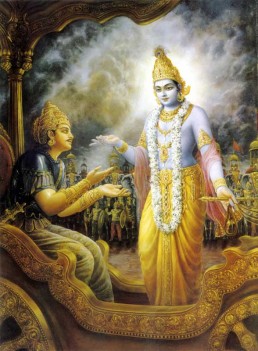Swami Chinmayananda
Swami Chinmayananda Commentary
All the people in the world do not worship at the same altar. Not only is this physically impossible, but it is psychologically absurd, since tastes differ from person to person.
The devotees, during their respective worship at the different altars, adore the same Vitality that is the Substratum for the created world of change. Even when they worship different deities, if their devotion is sufficiently reinforced with perfect faith, they are invoking nothing but the one Eternal Truth expressed through the form of their adoration. When once we accept the Infinite Reality as “One-without-a-second,” remaining the same in the past, present, and future, it is evident that the Self, as Consciousness — that expresses through the equipments of all Saints and Sages, Prophets and Incarnations of the past — is one and the same.
Toleration is the very breath of the Hindu creed, and we have already discussed earlier, how non-dualists, accepting the Absolute as Infinite, cannot but be tolerant. Intolerance is the creed of those who accept a single Prophet as God. Even among Hindus, all these who worship as members of a particular creed or sect, are generally found to be unrelenting fanatics. Some crude examples are even noticed where a devotee of one deity believes that, to utter blasphemies against the deities of others is adoration of his own beloved Lord! These are mere perversions, obnoxious and vulgar, which have no sanction in the Bible of the Hindus or anywhere in the cultural tradition initiated by the Rishis. The large-heartedness and endless love in the heart of Krishna makes him declare here that “THEY TOO WORSHIP ME ALONE, EVEN THOUGH BY WRONG METHODS.”
The stanza, viewed as an instruction for the external life in the work-a-day-world, suggests that, instead of seeking the infinite profit of the Bliss of Self-hood, those devotees who are trying to invoke other limited gains in the different fields of human activity, are also invoking the Grace of the Self — only “BY THE WRONG METHOD.”
Even the most sensuous, when he is planning to earn, to save and to spend so that he may procure, possess and enjoy the sensuous objects, is invoking the dormant capacities that lie in the Self in him. Sans Self none will be able to act either negatively or positively. Even in the case of suicide, a person is invoking Life, inasmuch as, even in the act of raising a weapon against himself, he is misusing the Grace of the manifested Life in him.
In this context the phrase “BY THE WRONG METHOD” only indicates that ultimately, it leads the seekers to the wells of dejection and sorrow that lie in the darkness of the not-Self, instead of leading to the Bliss-of-Perfection which is the nature of the Self.
WHY DO WE CALL THEIR METHODS AS “AGAINST WHAT THE LAW ORDAINS”?
Adi Sankara Commentary
Api, even; ye, those who; anya-devata-bhaktah, being devoted to tother deities; and anvitah sraddhaya, endowed with faith; yajante, worship (them), te api, they also; O son of Kunti, yajanti, worship; mam, Me; eva, alone; (though) avidhi-purvakam, following the wrong method. Avidhi implies ignorance. So the idea is that they worship (Me) ignorantly. ‘How it is that they worship (Me) ignorantly?’ [i.e. the worshippers of other deities worship them knowingly, and hence, how can the question of their ignorance arise?] This is being answered: Because-
The Bhagavad Gita with the commentary of Sri Sankaracharya – Translated by Alladi Mahadeva Sastry
Holy Geeta – Commentary by Swami Chinmayananda
The Bhagavad Gita by Eknath Easwaran – Best selling translation of the Bhagavad Gita
The Bhagavad Gita – Translation and Commentary by Swami Sivananda
Bhagavad Gita – Translation and Commentary by Bhaktivedanta Swami Prabupadha
Srimad Bhagavad Gita Chapter 9 – Verse 23 – 9.23 ye’pyanyadevata bhakta – All Bhagavad Gita (Geeta) Verses in Sanskrit, English, Transliteration, Word Meaning, Translation, Audio, Shankara Bhashya, Adi Sankaracharya Commentary and Links to Videos by Swami Chinmayananda and others – 9-23

